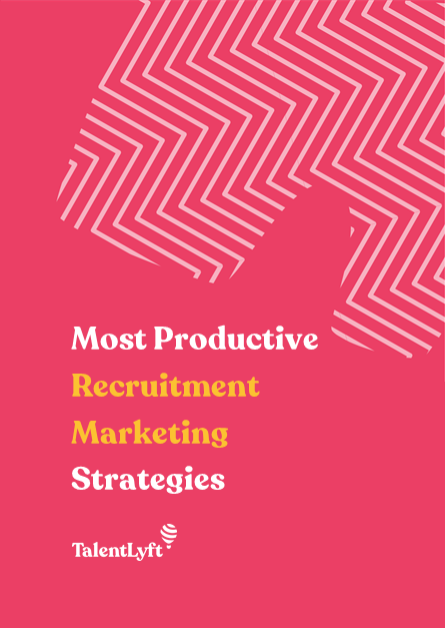
Social media recruitment is a must these days. But which social media is the most valuable when it comes to finding and hiring top candidates? Should you focus on Facebook, LinkedIn, Twitter or Instagram when recruiting?
Social media recruitment is a must these days. But which social media is the most valuable when it comes to finding and hiring top candidates? Should you focus on Facebook, LinkedIn, Twitter or Instagram when recruiting?
LinkedIn is ubiquitous when it comes to digital recruitment. The social network touts itself as “the world’s largest professional network” and it forms the bedrock of recruitment strategies across the world.
But LinkedIn isn’t the only social media platform that we should be considering when we’re recruiting employees. In fact, many others like Facebook, Twitter and Instagram, can be as, if not more, effective when it comes to promoting your employer brand and targeting particular role specialisms, demographics and skill-sets.
So, what social media platform is the best for recruitment? Let’s take a deep dive and compare top social media platforms to find out!
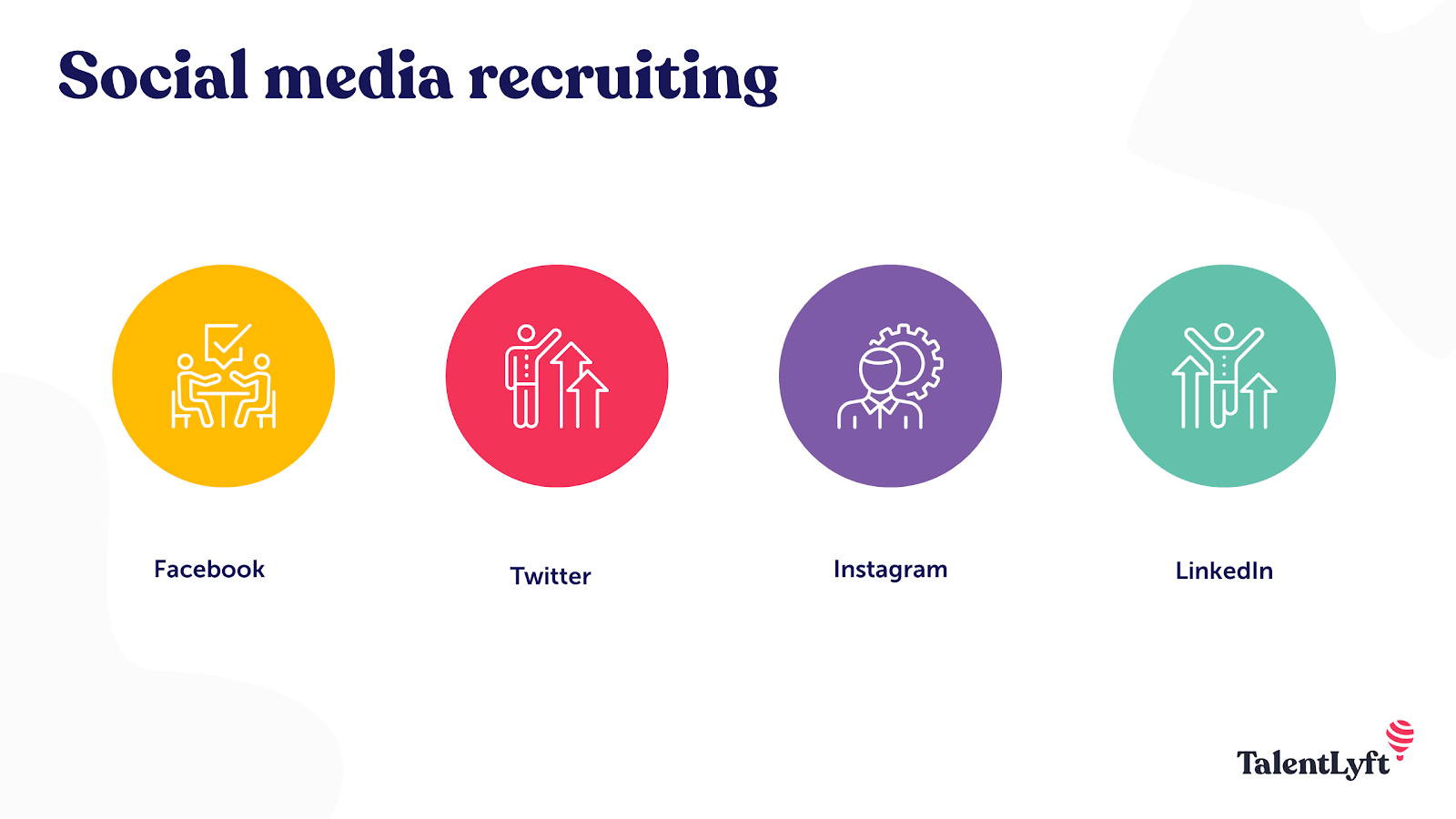
Versatility in a large recruitment campaign is essential when it comes to achieving results. And research suggests that Facebook’s inherent popularity with the 18 to 65 age group makes it a particularly useful social platform when you’re trying to attract candidates from across a broad range of demographics.
Facebook is generally considered as a personal social network by users and employers, rather than a professional one, and that becomes a key strength when you’re using it for recruitment. Think of it as the opposite to LinkedIn: it provides a broad base of passive and active candidates for you to target, improving your chances are finding the right candidate for the role.
Facebook job adverts are also really flexible, allowing you to target passive candidates based on their location, interests and likes – important attributes when running large-scale campaigns
#1 You can reach passive job candidates
It would be an HR professional’s dream if every perfect candidate was looking for a new role at the exact same time, but unfortunately, that’s not how it goes in reality. Sometimes, the best person for your role might not even be considering looking for another job – but they could be convinced.
One of the advantages of using Facebook is that it allows you to directly reach those ‘passive’ candidates, opening up a whole new candidate pool for you to target. A larger talent pool to target means that you’ll have more chance of finding the perfect candidate for the role you need to fill.
#2 Facebook is used by nearly every working-age demographic
There are few other social media platforms that come close to achieving the same kind of engagement with a range of demographics than Facebook. This makes it particularly useful if you’re recruiting for a company with a wide range of roles available.
A recent PewResearch study found that 79% of 18 to 29-year-olds are active on the platform, along with 79% of 30 to 49-year-olds and 68% of 50 to 64-year-olds, for instance. That’s a broad range of candidate groups that you’ll be able to target, depending on the group most appropriate for your role.
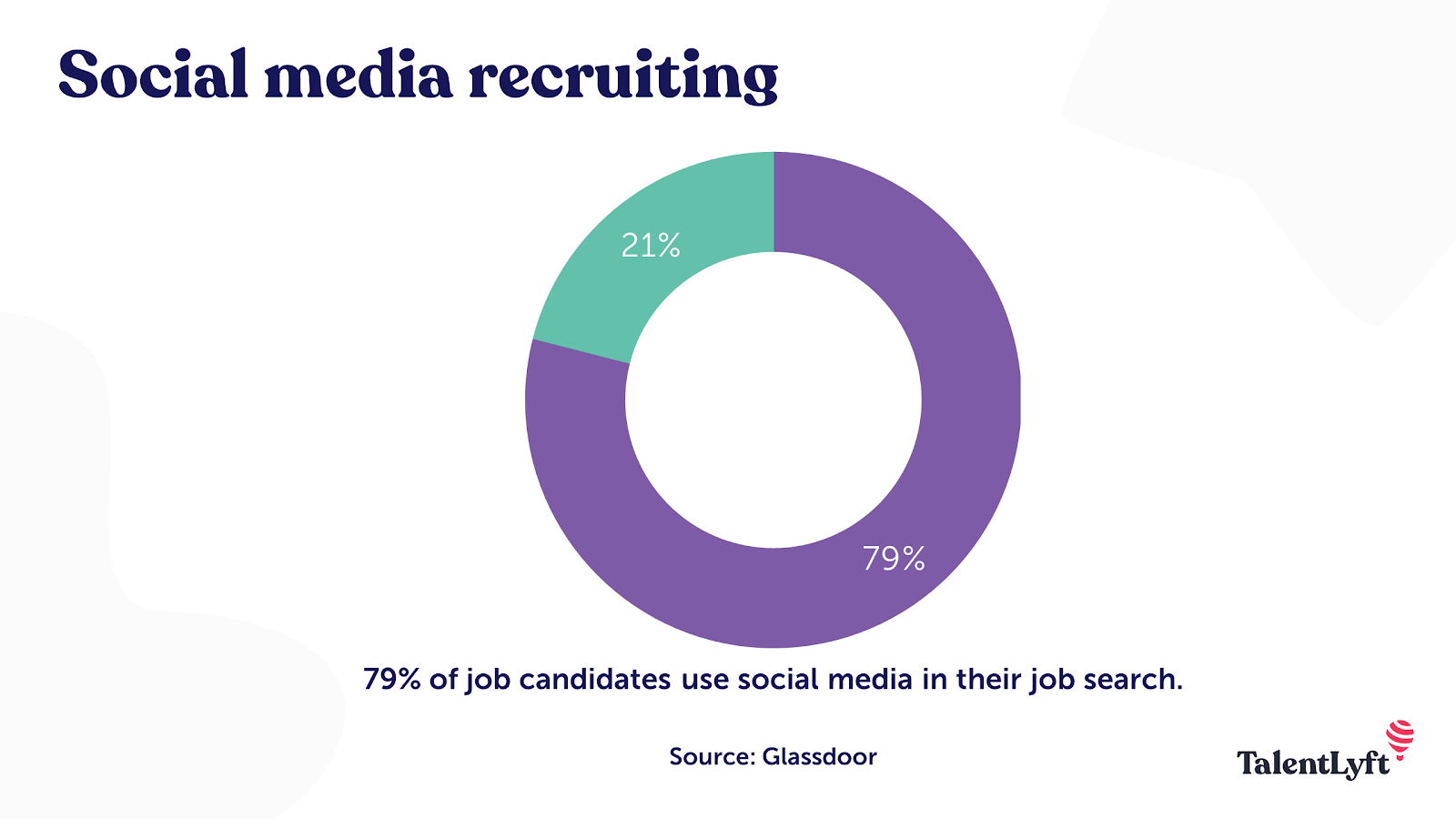
#1 You need to have a clear recruitment strategy
The broad demographics that are active on Facebook means that you need to have a clear recruitment strategy in mind so that you can attract the candidates with the specific skills, experience and attitude to the roles that you’re looking for.
Examining which demographics you need to target, and the skills and interests you expect them to have is essential for making sure you reach the right candidates. If you don’t have the time to do that, you could find that your results are sloppier than you expect.
#2 You need to think creatively with content – more so than other platforms
The sheer amount of content on Facebook means that you’re going to need to think creatively about content in order to cut through the digital noise when you’re trying to recruit on the platform. Spending time to create recruiting content, like videos and blogs that are tailored towards the specific type of candidate that you’re trying to attract, will help you to do that.
Facebook is most effective at large recruitment campaigns, aimed at many demographics. Learn how to make the most out of recruiting on Facebook:
Twitter is more than just a place to post your immediate thoughts about something – it’s also a fairly potent recruitment tool if you use it the right way. It combines the best features of a personal social media network and professional social media network, allowing you to find and contact professional candidates for a role in a more informal environment, and with significantly fewer barriers than LinkedIn. It also lets you examine the personalities of candidates in greater detail, giving you an extra indication of whether they’re a good cultural fit for your organization.
The PewResearch study found that 330 million use Twitter globally which gives it a decent candidate base for recruiters. In terms of demographic spread, it found that 44% of 18–24-year-olds, 31% of 25–30-year-olds, 26% of 30–49-year-olds, 17% of 50–64-year-olds, 7% of 65+-year-olds use the platform, with a majority of men using the platform as opposed to women. If you’re targeting young professionals (millennials and Gen Y), Twitter could be a surprisingly fruitful platform to use.
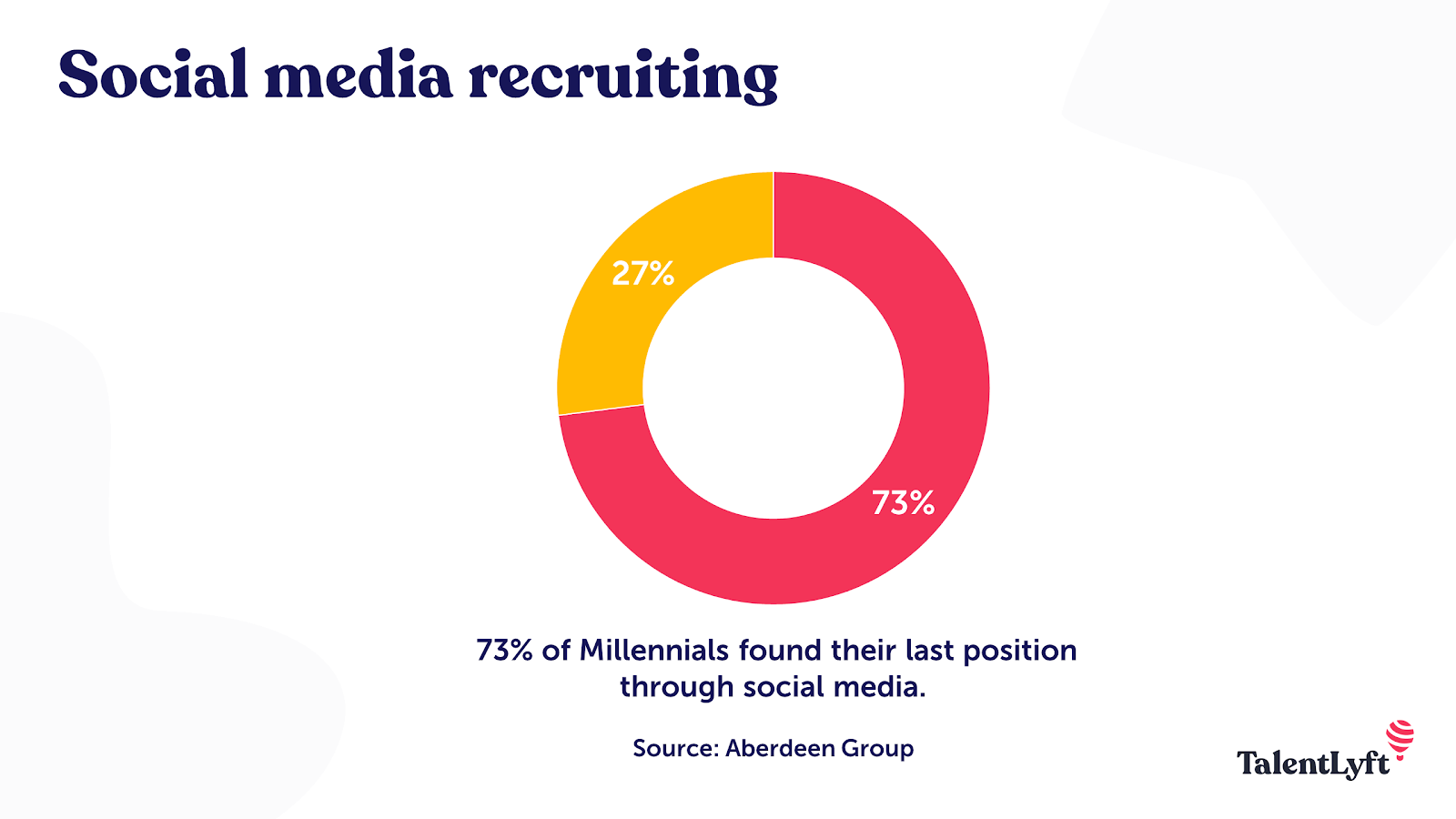
#1 It gives you a good idea of a candidate’s personality
Twitter is a strange cross between a personal and professional network, often allowing you to find out more about the personality of candidates that you would normally be able to on a professional social media platform, like LinkedIn for instance. Checking over a candidate’s tweets, retweets and likes can give you a good indication of whether or not they share the same values as your company, as well.
#2 Recruitment is usually cheaper – and more effective
A key thing that sets Twitter out from its competitors is the fact that you often don’t need to spend big bucks to get a really respectable level of reach. It’s significantly cheaper to use the platform to recruit people, and it’s easier to contact active and passive candidates directly, without needing to connect or send a friend request.
#1 Content has a short life span
Twitter is primarily a reactive platform. People post content that reacts to current events in real-time: they don’t generally use it to document key stages in their life as people do with LinkedIn or Facebook. This can have an effect on the type of strategy that you use. It makes more sense to create a lot of content with a short life span when using Twitter to recruit, rather than focusing on one big piece of long-life content.
#2 It needs sustained posting and outreach
The reactivity of Twitter as a social platform means that you’re going to need sustained posting and some clever targeting to make your content as effective as possible in reaching your target candidates. Directly reaching out to passive candidates can take a lot of time and resources too.
Twitter is useful for small, targeted recruitment campaigns.
There’s no getting away from the fact that LinkedIn is still by and far the most popular social media platform in use for digital recruitment. A recent Robert Walters whitepaper on the use of social media in the recruitment process, for instance, found that 86% of employers view LinkedIn as the best channel for recruitment.
Part of the reason behind that is the obvious fact that LinkedIn is a professional social network – it’s an online platform where professionals present their career history, network with others and look for new opportunities, making it the perfect hunting ground for recruiters. But it also has a few other advantages over other platforms: namely, the fact that it gives recruiters a broad overview of the career history and references of a candidate, too.
#1 It has a passive professional talent pool
With over 675 million members worldwide, LinkedIn is probably the largest social network focused specifically on professional development that you’re likely to find. The majority of people who use the network do so passively, so it can be an effective way to target the ideal candidates for your role who may not necessarily be looking for a role at the moment.
#2 It’s focused solely on careers and career development
LinkedIn is unique in that the content its users share is solely focused on professional development. This means that it is often easier to navigate than other social networks, having highly-focused and relevant content to the user, rather than masses of irrelevant content. This can help drive engagement when it comes to marketing your recruitment campaign.
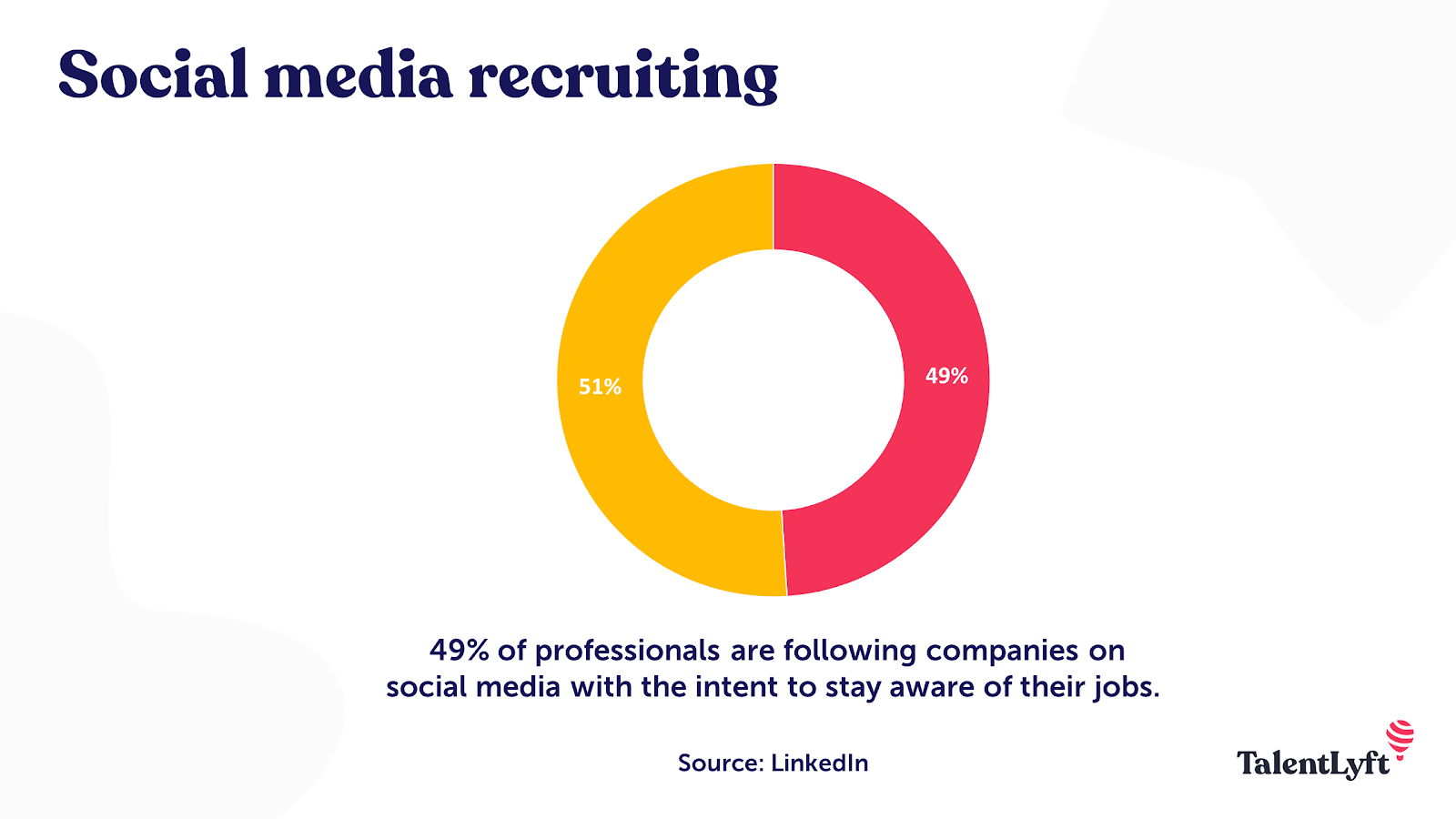
#1 Contacting passive candidates can be resource-heavy
A lot of the best candidates for positions that you’ll come across on the platform are likely to be passive candidates – those who are currently in a job and aren’t necessarily looking for a new one. Finding these and then reaching out to them can be an intensive process, draining time and resources if you’re not careful.
#2 Competition from other recruiters can be fierce
The success of LinkedIn as a recruiting platform means that it’s used by most recruiters as part of their recruitment strategies. As a result, it means that there’s a lot of competition amongst employers to net those high-quality candidates. As a result, you’re going to have to focus on the appeal of your advert, the persuasiveness of your job description, and your marketing to make an impact.
LinkedIn is best suited to traditional digital recruitment campaigns. Learn how to make the most out of recruiting on LinkedIn:
Instagram is a relative newcomer when it comes to recruitment strategies. The visual platform has grown from 30 million users a month in 2012 to a massive 1 billion users a month in 2020, making it a potentially powerful pool to recruit from – particularly if that recruitment is focused around the creative industries.
Unsurprisingly, Instagram is mainly used by younger demographics. The Pew Research survey found that 67% of 18 to 29-year-olds use Instagram regularly, making it an excellent platform for passive and active Gen Z and Millennial recruitment.
#1 There’s little direct competition from other recruiters
Compared to other social media networks, Instagram is relatively quiet when it comes to other recruiters using the platform. In recent years, it’s started to become more popular with recruiters, but it’s still a relatively unsaturated talent pool that offers a great chance to engage directly with candidates in an informal way.
#1 Content needs to be image-focused
At its core, Instagram is a visual platform. This means that any recruitment content you put on it needs to be image-focused in order to be effective – text-heavy posts just won’t engage with the network’s audience in the same way as image-based ones.
#2 Heavy Gen Z and Millennial focus
This point isn’t necessarily a bad thing, but it depends on the specific type of roles that you’re recruiting for. Instagram is heavily geared towards Gen Z and Millennial audiences so if you’re trying to recruit senior roles, it’s not necessarily the best option to invest time and energy into.
Instagram is the best choice for Gen Z and Millennial recruitment. Learn how to make the most out of recruiting on Instagram:
The overall answer is it depends on the recruitment strategy that you’re pursuing and the time and resources that your hiring team has to hand. The type of platform or platforms that you choose will depend on the unique recruiting objectives of your business. Hopefully, this article has given you a better idea of the pros and cons of each platform as a recruitment tool.
Christopher Fear is a writer at ICS Learn, the UK’s leading online learning provider of human resources qualifications.
What makes LinkedIn a top choice for recruitment?
LinkedIn's vast professional network and focused content make it highly effective for targeting passive candidates and professional talent.
How does Facebook's demographic reach benefit recruitment?
Facebook's broad age group engagement allows targeting of diverse demographics, making it suitable for large-scale recruitment campaigns.
Why is Twitter considered a potent recruitment tool?
Twitter's mix of personal and professional elements offers insights into candidates' personalities, aiding in cultural fit assessments.
What are the advantages of using Instagram for recruitment?
Instagram's strong engagement with younger demographics makes it ideal for recruiting creative professionals and younger talent pools.
How should companies choose the right social media platform for recruitment?
The choice depends on the company's specific recruitment objectives, candidate demographics, and the nature of the roles being filled.


